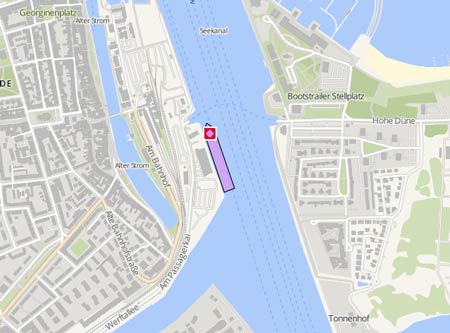PETROIL II
Course/Position
Latest ports
Latest Waypoints
Latest news
Report: inadequate maintenance, poor planning and an underqualified crew caused grounding
An investigation into the grounding of the "Arca 1" off Little Pond found that inadequate maintenance, poor planning and an underqualified crew caused the incident. The Transportation Safety Board released its report on March 19, 2018, 14 months after the bunkering tanker went aground at Little Pond, about 10 kilometres from Sydney. There were no injuries to the six crew members on board and the grounding did not result in the release of any pollutants. On Jan. 8, 2017, the "Arca 1" was on its way to Mexico from Sorel, Quebec, when it went aground in heavy weather. It was under reduced propulsion at the time due to a failure of the port propulsion clutch. The main propulsion clutch had not been checked and adjusted before or during the voyage, as is recommended. As a result of the grounding, the vessel sustained major damage to the hull and propulsion machinery. After an initial failed attempt, a few days later, the tanker was refloated and towed to Sydney. “Due to the resulting reduced propulsion and the adverse environmental conditions, the vessel was unable to make headway, drifted to the shoreline, and went aground. As a result of some crew members' performing roles for which they were not qualified, some tasks weren’t completed while others were ineffective. Voyage planning was carried out in a manner that was not consistent with best practices. “Although the master estimated that the voyage to Sydney, Nova Scotia, would take 12 hours, in reality 15 hours would have been required. This additional 3 hours of transit shortened the time available for the vessel to arrive at Sydney before the weather deteriorated.” The report also noted that when port propulsion was lost as a result of the failure of the clutch, propulsion power was reduced by half, reducing the MV ARCA 1’a speed. That also increased the time required to complete the voyage before the weather worsened. While they made an effort to drop anchor, it couldn’t hold. The tanker hit bottom, rendering the starboard Z-drive inoperative. The anchor was set again, but the vessel kept drifting west towards the shore until it ultimately ran aground. The decision to sail was not consistent with the limitations imposed on the vessel in its single voyage for delivery authorization. “The master, who was not qualified to serve in that role on the Arca 1, carried on assuming the role of master during the voyage and made critical decisions, such as the decision to sail on the day of the occurrence. Because he did not serve the role of chief engineer, for which he was qualified, the primary oversight of the mechanical systems during the voyage was left to the motorman, who was not a qualified chief engineer.” The crew was not aware of previous maintenance carried out on the vessel, and the vessel had been out of service for two years prior to the grounding.
TSB to probe grounding of bunker tanker
Investigators from Canada’s Transportation Safety Board returend to Cape Breton after the "Arca 1" was towed to Sydney by the "Tim McKeil", a powerful tugboat owned and operated by McKeil Marine, a Hamilton, Ontario-based firm that has interests in Cape Breton, and safely berthed at a dock at the Sydport Industrial Park. The team originally sent to the scene on Jan. 9 in anticipation of a quick rescue was recalled after it was determined it would take a few days before the ship could be successfully freed from where it was beached. The team was mpw being reassembled, but with at least one member coming from Ottawa it will take some time to mobilize. Once in Cape Breton, the investigators will have safe access to the vessel that is now berthed at the dock owned by Heddle Marine NL, a Newfoundland subsidiary of Hamilton, Ont.-based Heddle Marine Services Inc. The experts will look at the technical aspects to figure out why the power quit and the ship lost propulsion. Marine industry observers have been asking questions since Jan. 8, when the "Arca 1" lost propulsion and was pushed onto the shore by the strong winds of a harsh winter storm. The analysts said the ship’s hull was too flat and that the vessel’s outboard propulsion system was not adequate for rough waters such as the Cabot Strait. Report with photo: http://www.capebretonpost.com/news/local/2017/1/16/tsb-to-probe-incident-that-saw-tanker-stranded-off-cape-breton.html
Tanker refloated after one week
The "Arca 1" was refloated on Jan 15 at 10 a.m. with the high tide, after pumping 300 tons ballast water from the vessel. The tanker was taken to Sydney port and docked in the afternoon. The salvage lasted for about a week, more than 100 people, several government agencies, the port authorities and the salvage company McKeil Marine were deployed. Report with photos: http://www.cbc.ca/news/canada/nova-scotia/arca-1-vessel-removed-tanker-cape-breton-1.3936654
Upload News

